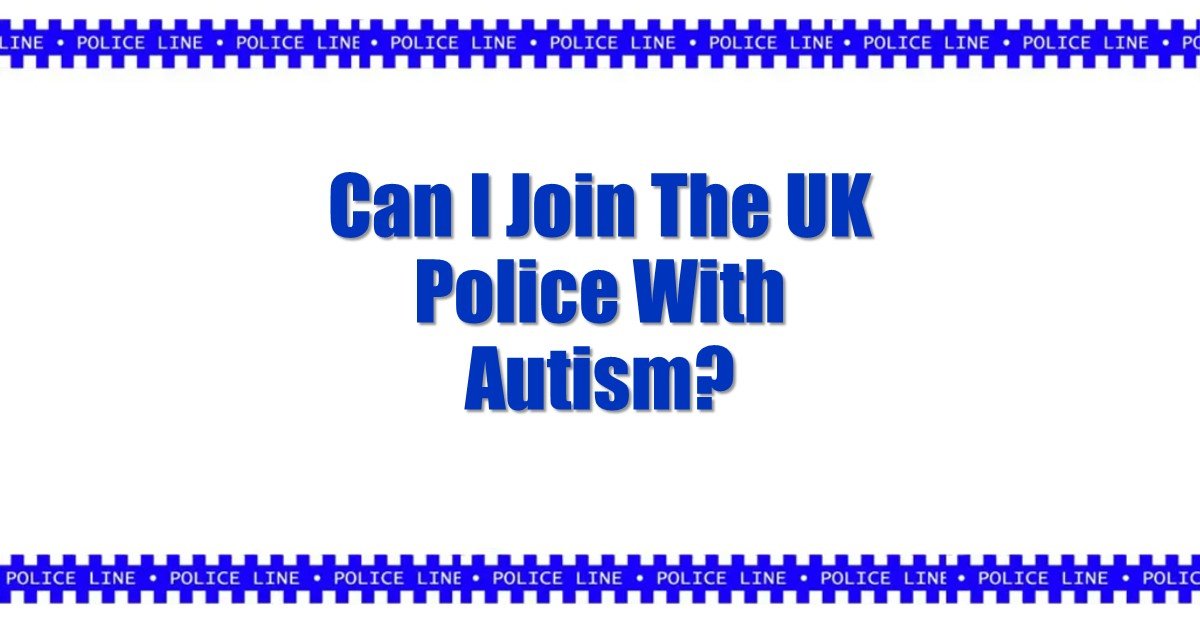As someone with autism, you may be wondering if it’s possible to join the UK police force. The good news is that having autism does not automatically disqualify you from becoming a police officer. However, there are certain considerations and requirements that must be met in order to ensure that individuals with autism can perform their duties effectively and safely. So read on and we’ll try and answer the question, can I join the UK police with autism?
- Understanding The Recruitment Process For UK Police Officers
- The Importance Of Accommodations And Support For Autistic Individuals
- Mental Agility And Emotional Resilience In Law Enforcement
- Alternatives
- Success Stories From Autistic Police Officers
- What Are Your Concerns?
- Are You An Autistic Police Officer?
- Final Thoughts: Can I Join The Uk Police With Autism?
While the recruitment process for any job can be daunting, joining the police force might feel particularly intimidating as it requires a high level of physical fitness, mental agility, and emotional resilience.
But don’t let this discourage you!
With the right support and accommodations, people on the autism (including neurodivergent) spectrum have successfully joined law enforcement agencies around the world, including the UK.

So if you’re passionate about making a difference in your community and upholding justice, read on to learn more about what it takes to become an autistic police officer in the UK.
Understanding The Recruitment Process For UK Police Officers
The UK police force is a diverse team of individuals working together to protect and serve the community.
Like every other organisation, they have recruitment criteria that must be met before becoming one of their officers.
The eligibility requirements are stringent, but it’s not impossible to join with autism.
Recruitment criteria for joining the UK police include nationality, education level, physical fitness, criminal record check, and medical assessment.

These measures ensure that only those who meet specific standards become part of the force.
Eligibility requirements also consider personal attributes such as communication skills, problem-solving ability, teamwork mentality, and emotional intelligence.
This is assessed via a national assessment centre and in-force selection process.
While having autism may affect certain aspects of these qualities or hinder some social interactions in daily life, it doesn’t automatically disqualify you from being an officer.
The Importance Of Accommodations And Support For Autistic Individuals
Understanding the recruitment process is essential to know before aspiring to join this prestigious force.
However, some individuals may have concerns about their eligibility due to certain conditions such as autism. The good news is that having autism does not automatically disqualify someone from becoming a police officer in the UK.
It is crucial for employers to provide workplace accommodations and support for autistic individuals who wish to work in law enforcement.
If you are autistic, or supporting somebody with the application process who is autistic, you will be all too aware that this is a broad spectrum, meaning individuals are abled in different ways.
Check out this article on the qualities of a good police officer, also this article which takes you through a day in the life of a police officer, and this article on the common types of incidents that you will be expected to attend, and finally this article on the skills of a good police officer.
This is important to read to see if you think that your autism will support you in these scenarios.
By doing this you will get a good indication as to whether you feel that being a police officer is for you.
Another option is to go on a ‘ride along’. Most forces will offer these, and although you’re not going to be exposed to incidents in the same manner as you would if you were dealing with them. It will give you a ‘taste’ of what to expect.
Mental Agility And Emotional Resilience In Law Enforcement
Physical fitness is an essential aspect of joining the police force, but it’s not the only one. Mental agility and emotional resilience are equally important in policing. These traits help officers to remain calm under pressure and adapt to changing situations quickly.
As someone with autism, coping mechanisms for stress will be crucial when working as a police officer.
Effective communication techniques will also play a significant role in navigating high-pressure scenarios while on duty. This is not only for your safety but that of your colleagues and others.
You will need to ensure that your communication skills are up to the required standards.
Alternatives
If you do not feel that being a police officer is going to align with your needs, why not consider a support staff role?
There are a number of amazing roles within policing, other than being a police officer, which may support you better than being a police officer, whilst still allowing you to be part of the police family.
Success Stories From Autistic Police Officers
Autistic officers bring unique strengths to policing that can be incredibly valuable. Many of these individuals possess a remarkable attention to detail, an unwavering dedication to the task at hand, and an ability to think outside the box when it comes to problem-solving.
These are all traits that can serve them well in police work.
What Are Your Concerns?
Are you autistic and have some specific concerns about joining the police that we haven’t addressed? If so, let us know in the comments below and we will try and find the answers to your questions in order to support you in making an informed decision.
Are You An Autistic Police Officer?
Are you an autistic police officer and are willing to share your story? If so it could potentially support so many people who are interested in joining the police but are concerned about the reality.
Let us know in the comments below.
Final Thoughts: Can I Join The Uk Police With Autism?
So, can you join the UK police with autism? The answer is yes! While there may be some challenges and additional accommodations needed, autistic individuals have successfully joined the force and made significant contributions to their communities.
However, you have to be aware of your own needs too, if putting yourself in the situations that police officers do is going to cause you unnecessary stress, it may be worth considering different roles within policing. You can still serve your community.
If you are interested in joining the police force but have concerns about your autism diagnosis, know that there are resources available and successful examples to follow. Don’t let your diagnosis hold you back from pursuing your dreams of making a difference in your community as a police officer.



